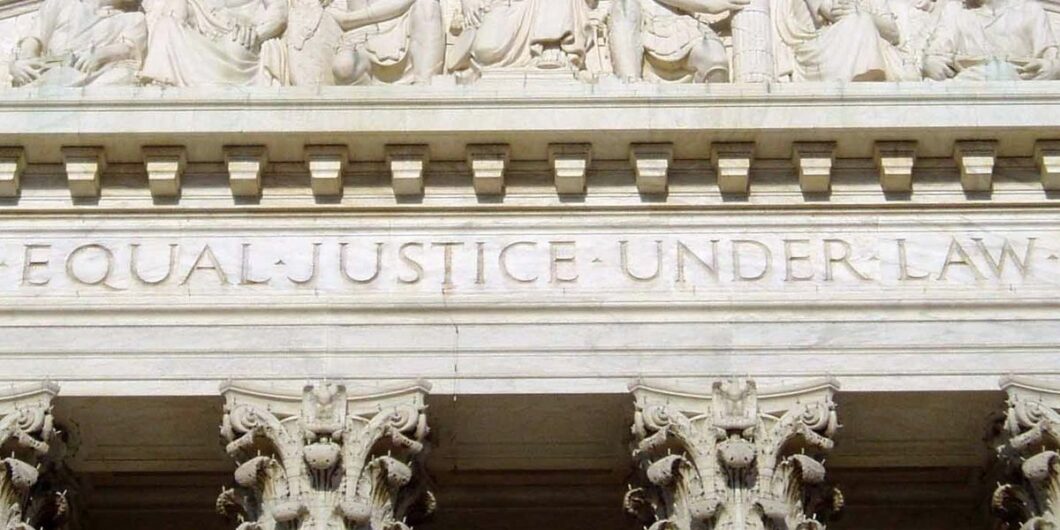Should Classical Liberals Favor Lawsuits Over Arbitration?
Many Americans are understandably troubled by the scale and influence of global companies, especially in Big Tech. Social media platforms collect personal data, censor the transmission of news and conservative speech, dump vast sums into elections on behalf of progressive candidates, and sometimes—such as with so-called Zuckerbucks—attempt to subvert the neutrality of the election process. To some “post-liberal” center-right critics, these abuses are emblematic of flaws in capitalism itself. One of the “coercive” features of corporate overreaching cited by such critics is many businesses’ reliance on contractual arbitration clauses as an alternative to litigation by employees and consumers.
Critics refer to this as “forced arbitration” and claim that it constitutes a denial of due process—tyranny, even. Is this criticism fair? Without defending the abuses of Big Tech, this essay endeavors to explain the ubiquity of contractual arbitration clauses and their benefits vis-à-vis resolving disputes through lawsuits.
Let us begin with the basics. In the US, legal disputes involving civil (i.e., non-criminal) claims are presumptively resolved by the filing of a lawsuit in the appropriate court. Lawsuits generally require the assistance of a lawyer, are very expensive for both plaintiff (the person or entity bringing the claim) and defendant (the person or entity defending the claim), often take years to reach a decision, and—whether decided by a judge or jury—are subject to unpredictable results. The uncertainty is so great that the civil justice system is sometimes referred to as a “litigation lottery.” Because of the so-called American rule, dictating that each side bear its own attorneys’ fees in litigation, the winning party in a typical lawsuit is often a Pyrrhic victor.
As a result of these defects, lawsuit abuse has enriched lawyers, increased insurance premiums, inflated the price of certain products, inhibited the development of new drugs and products, and led corporate defendants to settle most employment and consumer lawsuits out of court—regardless of their merit (or lack thereof). Lawyers who specialize in filing lawsuits against deep-pocketed corporations—the “plaintiffs’ bar”—have become a powerful and well-funded special interest group, overwhelmingly supporting Democratic candidates and elected officials. For decades, conservatives have advocated reforms—usually referred to as “tort reform”—to make the litigation process more prompt, efficient, and predictable.
This topic has been the focus of leading center-right legal scholars such as the late Peter Huber and a mainstay of respected think tanks such as the Manhattan Institute. The literature cataloging the defects of our litigation system is vast. As a longtime proponent of civil justice reform, I have condemned abusive litigation in Law & Liberty and elsewhere.
Resolving disputes through the civil justice system is so costly, disruptive, protracted, and uncertain that many litigants—whether corporations, government entities, or individuals—choose to utilize alternatives, such as mediation by a third party or arbitration by a retired judge or experienced lawyer. Arbitration is a streamlined mini-trial conducted in accordance with prescribed rules and procedures, before a neutral decision-maker. The parties can be represented by counsel, limited discovery is permitted, witnesses testify, and the arbitrator issues a written decision. Disputes are resolved within months, not years.
Alternatives to litigation such as arbitration are so popular that the American Arbitration Association (AAA) was founded in 1926, following the enactment of the Federal Arbitration Act in 1925. AAA reports that it has resolved over 500,000 cases so far this year, and has administered nearly eight million cases since 1926. These numbers are striking because AAA is just one of many administrators of arbitrations in the US. Arbitration has become a growth industry, with many practitioners and numerous providers.
Courts generally enforce arbitration clauses in contracts so long as the prescribed procedures are fair and ensure due process. In fact, virtually every union contract in America contains a provision requiring all disputes between employees and the employer to be resolved by final and binding arbitration. Contrary to the impression created by arbitration critics, in other words, arbitration was not concocted recently by Silicon Valley oligarchs; it has been around for a century, has received the blessing of Congress, is embraced by organized labor, and has been upheld by the US Supreme Court. Even critics of “forced arbitration” concede that “Arbitration, at least in theory, can be a simpler, more streamlined process that costs less for each party and brings the issue to a quick, efficient conclusion without dragging through the court system for months or even years.”
Absent credible evidence of defects, the caveat “at least in theory” allows lazy critics to avoid comparing arbitration to its alternative—litigation. Yet the comparison is unavoidable. Arbitration clauses have become ubiquitous because lawsuits are a terrible way to resolve disputes, as anyone with experience as a civil litigant can attest. Juries are fickle, delays are endemic, discovery is intrusive and burdensome, and expenses are exorbitant. Arbitration clauses are now common in executive employment agreements, engagement letters with large law firms, in the securities industry (governing disputes between investors and stock brokers), and in many commercial agreements. If one carefully reviewed the written contracts one encounters in one’s daily life—leases, purchase agreements, credit card applications, cellphone contracts, and the like—one would probably find a standard-form arbitration clause.
There is a reason for the ubiquity of arbitration. Arbitration clauses abound because litigation is almost universally disfavored—even by law firms!—as a means of resolving disputes.
The door to the courthouse is always open to anyone who has not agreed to use arbitration instead. This is the heart of critics’ objection to arbitration clauses by “Big Business” and app-based service providers: critics claim that burying arbitration in the “terms and conditions”—which few people read before clicking “I agree”—somehow makes the arrangement “coerced.” This is an important point to explore, because the crux of the “coercion” issue is whether the agreement to arbitrate disputes was consensual or voluntary. In truth, consumers are generally not “forced” to do business with particular vendors or even to transact in particular industries. There are exceptions, such as emergency medical treatment, but for the most part, consumers retain—and frequently exercise—a significant degree of volition.
Classical liberals should prefer private ordering to government-imposed solutions, and respect personal autonomy over statist command-and-control.
“Freedom of contract” cannot be ignored, or dismissed as a figment of “free market absolutism.” Even if consumers do not individually negotiate with a corporate seller, our ability to grant—or withhold—assent is critical to maintaining our autonomy. When we go to the grocery store, we decide which one, and then roam the aisles choosing which items to purchase. The same is true for shopping for cars, clothes, and other consumer goods. No one holds a gun to our head and dictates Safeway instead of Kroger, one brand over another, and so forth. We have a cornucopia of choices. The same is true for the products peddled by Big Tech. There are alternatives to Google, Apple, Uber, Amazon, and other vendors. Moreover, consumers always have the power to boycott specific companies (or entire industries) to which they object.
Participating in the world of social media—in which many non-essential services are offered without charge—is a choice. No one is “forced” to have an account on Facebook, TikTok, Instagram, or X (formerly known as Twitter), and many Americans do not. That most consumers elect not to read the fine print does not mean that the terms and conditions are “coerced” or unconscionable. Critics of arbitration clauses concede that “Yes, the consumer has the ability to click and find a copy of what he is agreeing to, but almost nobody does that because it simply doesn’t seem necessary.” (emphasis added.) Choosing not to read a contract before accepting it is careless and not grounds for sympathy—especially from libertarians and conservatives, who normally exalt individual responsibility.
Arbitration is not perfect, of course; nothing is. Some arbitrators, and arbitration providers, are better than others. The same is true with judges, juries, and court systems. Arbitration is best suited for individual claims, and has occasionally wrestled with accommodating class actions and other mass claims. Nevertheless, arbitration is flexible enough to handle construction disputes, complex cases, international disputes, and class claims, in addition to routine consumer or employment disputes. Critics admit that plaintiffs’ lawyers have managed to bring class claims against Uber and Samsung, notwithstanding arbitration clauses. Plaintiffs’ lawyers detest arbitration because—unlike in litigation—they cannot use the expense and unpredictability of a jury trial to leverage an extortionate pretrial settlement from the defendant.
Some Big Tech excesses will have to be addressed legislatively, such as eliminating Section 230 of the Communications Decency Act and regulating personal data collection, or through antitrust enforcement actions brought by state attorneys general or the Department of Justice. More congressional oversight is needed to prevent censorship of speech and suppression of news on social media platforms. But this can be accomplished without knee-capping the widespread use of arbitration clauses.
Defending America’s uniquely unsatisfactory litigation system—often resembling Dickens’ Bleak House—was once the province of the contingent-fee plaintiffs’ bar and its academic apologists. Now, ironically, some conservative pundits have entered the business-bashing fray. In considering critics’ vague complaints about arbitration, one must remember that courts of law do not have a monopoly on justice or due process. Banning arbitration clauses would not “democratize” dispute resolution or increase corporate accountability; it would merely erase decades of progress in finding sensible alternatives to our dysfunctional civil justice system. Diverting all disputes now being arbitrated into the court system would just congest crowded dockets even further.
Classical liberals should prefer private ordering to government-imposed solutions, and respect personal autonomy over statist command-and-control. A law categorically banning consensual arbitration clauses for consumers—tossing them “into the ash heap of history”—would interfere with private ordering and force all consumers into a problematic legal system that is less efficient and more prone to abuse than arbitration. Knee-jerk objections to every feature of Big Business are neither thoughtful nor persuasive, and cursory calls to ban arbitration clauses are both unconvincing and inconsistent with conservative principles.



